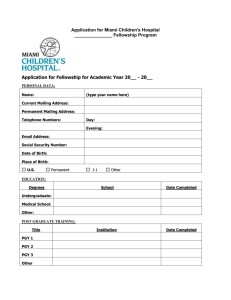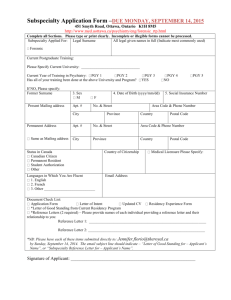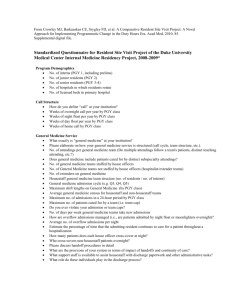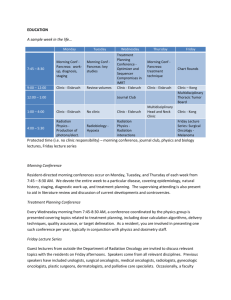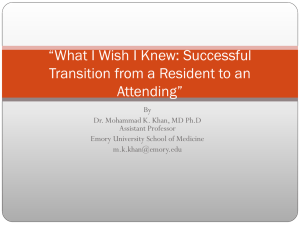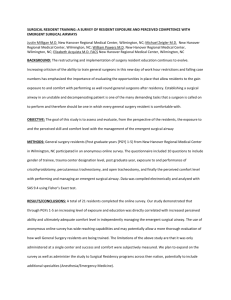Core Competencies Level Expectations for the MSU Hematology
advertisement
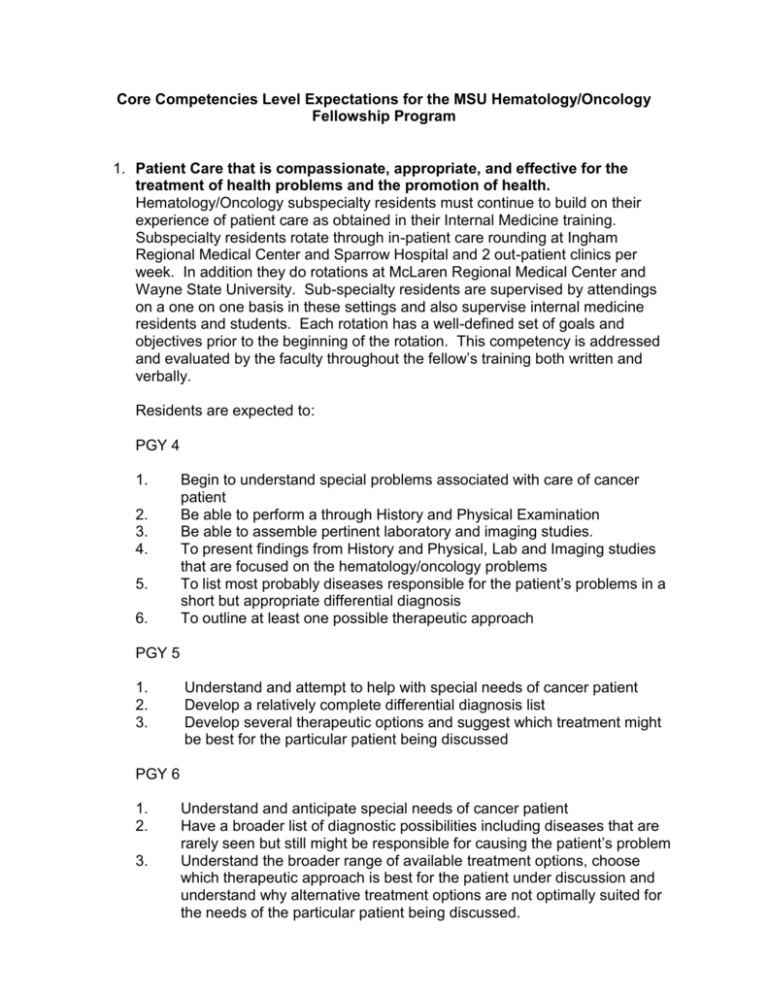
Core Competencies Level Expectations for the MSU Hematology/Oncology Fellowship Program 1. Patient Care that is compassionate, appropriate, and effective for the treatment of health problems and the promotion of health. Hematology/Oncology subspecialty residents must continue to build on their experience of patient care as obtained in their Internal Medicine training. Subspecialty residents rotate through in-patient care rounding at Ingham Regional Medical Center and Sparrow Hospital and 2 out-patient clinics per week. In addition they do rotations at McLaren Regional Medical Center and Wayne State University. Sub-specialty residents are supervised by attendings on a one on one basis in these settings and also supervise internal medicine residents and students. Each rotation has a well-defined set of goals and objectives prior to the beginning of the rotation. This competency is addressed and evaluated by the faculty throughout the fellow’s training both written and verbally. Residents are expected to: PGY 4 1. 2. 3. 4. 5. 6. Begin to understand special problems associated with care of cancer patient Be able to perform a through History and Physical Examination Be able to assemble pertinent laboratory and imaging studies. To present findings from History and Physical, Lab and Imaging studies that are focused on the hematology/oncology problems To list most probably diseases responsible for the patient’s problems in a short but appropriate differential diagnosis To outline at least one possible therapeutic approach PGY 5 1. 2. 3. Understand and attempt to help with special needs of cancer patient Develop a relatively complete differential diagnosis list Develop several therapeutic options and suggest which treatment might be best for the particular patient being discussed PGY 6 1. 2. 3. Understand and anticipate special needs of cancer patient Have a broader list of diagnostic possibilities including diseases that are rarely seen but still might be responsible for causing the patient’s problem Understand the broader range of available treatment options, choose which therapeutic approach is best for the patient under discussion and understand why alternative treatment options are not optimally suited for the needs of the particular patient being discussed. 2. Medical Knowledge about established and evolving biomedical, clinical, and cognate sciences and the application of this knowledge to patient care. Subspecialty residents are required to apply medical knowledge to patients by demonstrating an investigatory and analytical thinking to clinical situations. Required inpatient clinical experiences include rotations on the clinical service at Ingham Regional Medical Center and Sparrow Hospital. Didactic sessions consist of required weekly conferences held on Friday morning. These core conferences topics include: morphology, physiology and biochemistry of blood, marrow, lymphatic tissue; basic molecular and pathophysiologic mechanisms, diagnosis and therapy of diseases of the blood; pathology, staging and management of neoplastic disorders; immune markers, immunophenotyping, cytochemical studies; chemotherapeutic drugs, pharmacokinetics; multi-agent chemotherapy protocols; principles of surgery and radiation therapy in cancer; management of neutropenic fever; effects of systemic disorders, infections, solid tumors; pain management in the cancer patient; hospice and home care. Board certification exams are a critical evaluation of this core competency. PGY 4 – Resident must be able to perform a competent hematology/oncology focused History and Physical and is capable of literature based investigations via the MSU Electronic library to develop a broad range of differential diagnosis with appropriate laboratory and imaging studies. Resident begins to develop basic knowledge of criteria necessary for appropriate hematology/oncology diagnosis. PGY 5 – Resident will build skills developed in first year to extend knowledge base so that common disease problems are approached utilizing the basic understanding of the disease developed during the 1st year of Hematology/Oncology Training. PGY 6 – In addition to the skills and knowledge base developed in the first 2 years of the fellowship, the resident develops a comfort and familiarity with common Hematology/Oncology diseases based on 2 years of caring for the patients. In addition, the resident is expected to expand their appreciation for the correct understanding and need for increased research related to Hematology/Oncology diseases. This will be developed with the aid of the MSU electronic library and attendance and presentation at local and national professional meetings. 3. Practice Based Learning and Improvement that involves investigation and evaluation of their own patient care, appraisal and assimilation of scientific evidence and improvements in patient care. This competency is assured through review of case in groups and presentation of scientific data relevant to the care of the patient. PGY 4 – Via introductory lecture series, Friday Core Conferences and monthly research conference and weekly Monday Journal club, the resident will develop an understanding of how practice in Lansing incorporates this information to improve care of the H/O patient. PGY 5 – Builds upon 1st years of training and experience to help guide patient care through the Lansing based system. The resident should become facile with the system so that patient care, where possible, is streamlined and expedited. PGY 6 - Builds on 1st two years of experience with the aid of literature and tries to improve or modify the current local approach to H/O patient care. The focus of this improvement is making the system easier for the patient while at the same time improving their health care. 4. Interpersonal and Communication Skills that result in effective information exchange and learning with patients, their families, and other health care professionals. PGY 4 – learns about special needs of H/O patients in terms of personal and psychological support. Begins to understand the importance of listening to patients and trying to help them as the psychological aspects of their disease require help. PGY 5 – Builds on 1st years experience and develops a significant doctor patient relationship that allows the patient to feel comfortable discussing their problems with the fellow who they now recognize as one of their important care givers. PGY 6 – Based on their past 2 years experience begins to encourage patients to discuss medical and emotional problems and feels comfortable talking with patients and family in the setting of a family conference. 5. Professionalism. Residents must demonstrate a commitment to carrying out professional responsibilities, adherence to ethical principles, and sensitivity to a diverse patient population. Evaluation of this competency occurs by direct observation, as well as evaluation given by other physicians and health care professionals such as nurses, pharmacists, and social workers. PGY 4 – Must be able to be punctual, complete all tasks as asked, follow directions, have a timely response to staff needs including pages and abnormal laboratory results, be honest, have appropriate use of coding and billing, demonstrate respect for patients and co-workers including understanding issues of culture, age, sex, sexual orientation and disability. PGY 5 – Continue to adhere to expectations of first year of training. Begins to act as a leader and role model for the residents and students on various rotations. Begins to anticipate needs of other health care providers. PGY 6 – Able to hold family conferences to explain patients problems, deliver bad news, volunteers for institution committees, provides leadership for the program. 6. System-Based Practice where residents must demonstrate an awareness of and responsiveness to the larger context and system of health care and the ability to effectively call on system resources to provide care that is of optimal value. The fellows interact with a number of health systems ranging from HMO’s, hospital based practice and free standing outpatient facilities and numerous payer types. Furthermore, hospice is an important part of care delivery. We have didactic lectures from our colleagues at Hospice as well as palliative care lectures to address medical and systems issues in the care of patients. PGY 4 residents are expected to advocate for their patients in terms of obtaining resources that might be available through the cancer center and the hospital to help patients get the diagnostic tests and treatment appropriate for their patients. PGY 5 residents are expected to build on their first year experience. The second year residents are expected to know some of the limits of clinic, hospital and insurance companies in terms of supporting expensive diagnostic and therapies that are new, but have not yet been approved by the FDA. PGY 6 residents are expected to expand on their experience of the second year and to advocate for their patients as if they were the attending. To be more specific they should be able to contact hospital administrators and arbitrators of insurance companies to attempt to get the best care for their patients. CLINICAL ROTATIONS PROGRESSION OF EXPECTATIONS FOR PGY 4, PGY 5 AND PGY 6 HEMATOLOGY/ONCOLOGY RESIDENTS The PGY 4 hematology/oncology residents are expected to: 1. 2. 3. 4. 5. Be able to perform a thorough History and Physical Examination. To be able to assemble pertinent laboratory and imaging studies. To present findings from History and Physical, Lab and Imaging studies that are focused on the hematology/oncology problems. To list the most probable diseases responsible for the patient’s problems in a short but appropriate differential diagnosis. To outline at least one possible therapeutic approach. The PGY 5 hematology/oncology residents are expected to: 1. 2. Develop a relatively complete differential diagnosis list Develop several therapeutic options and suggest which treatment might be best for the particular patient being discussed The PGY 6 hematology/oncology residents are expected to: 1. 2. Have a broader list of diagnostic possibilities including diseases that are rarely seen but still might be responsible for causing the patient’s problem Understand the broader range of available treatment options, choose which therapeutic approach is best for the patient under discussion and understand why alternative treatment options are not optimally suited for the needs of the particular patient being discussed. Revised March 2009
